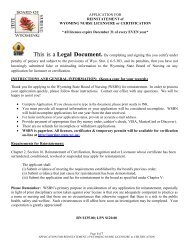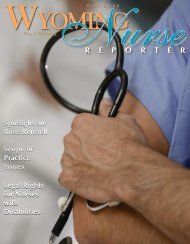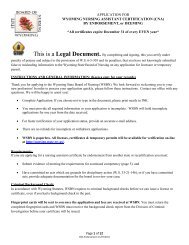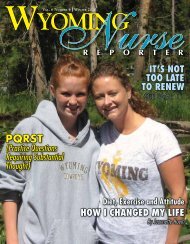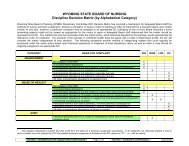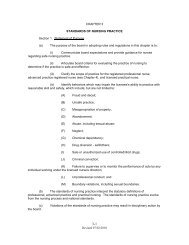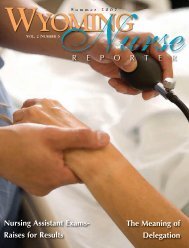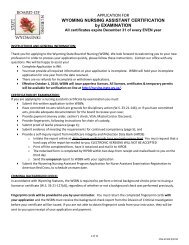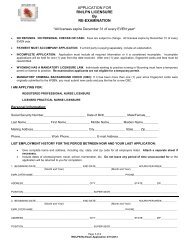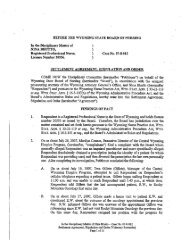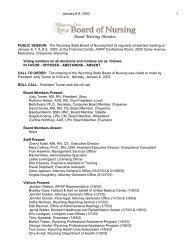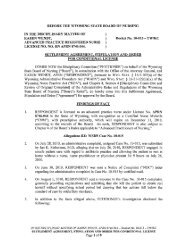Nurse Reporter Spring 2009 - Wyoming State Board of Nursing
Nurse Reporter Spring 2009 - Wyoming State Board of Nursing
Nurse Reporter Spring 2009 - Wyoming State Board of Nursing
Create successful ePaper yourself
Turn your PDF publications into a flip-book with our unique Google optimized e-Paper software.
• Are there written policies and procedures available to describe how and<br />
under what conditions you will perform this task?<br />
• Does the new responsibility require pr<strong>of</strong>essional judgment or simply the<br />
acquisition <strong>of</strong> a new skill?<br />
• Is this a new expectation for all RNs? LPNs? APRNs?<br />
• Has this been done before by others in your unit or health care facility?<br />
• Is it just new to you?<br />
• Has a pr<strong>of</strong>essional nursing organization (most relevant to the question<br />
being asked) issued a position statement on this topic?<br />
• What about the other facilities in your community or region?<br />
• What are the nurse manager’s expectations about you or other RNs, LPNs,<br />
APRNs, becoming responsible for this procedure?<br />
• When will this become effective?<br />
• Will there be an opportunity to help you attain the needed clinical competency?<br />
• Who will be responsible for the initial supervision and evaluation <strong>of</strong> this<br />
newly performed task?<br />
• Will you be given additional time to learn the skill if you need it?<br />
Assess Your Own Abilities:<br />
• Are you clinically competent to perform this procedure?<br />
• Do you currently have the knowledge and skills to perform the procedure?<br />
• Have you had experience in previous jobs with this procedure?<br />
• Who is available to assist you who has that skill and knowledge?<br />
• Is that person accessible to you?<br />
• Do you believe you will be able to learn the new skill in the allotted<br />
time?<br />
• How can you determine that you are practicing within your scope <strong>of</strong> nursing?<br />
• What is the potential outcome for the patient if you do or do not perform<br />
the procedure?<br />
Identify options and implications <strong>of</strong> your decision. The options include:<br />
• The responsibility/task is not prohibited by the <strong>Nurse</strong> Practice Act.<br />
If you believe that you can provide safe patient care based upon your current<br />
knowledge base, or with additional education and skill practice, you<br />
are ready to accept this new responsibility. You will then be ethically and<br />
legally responsible for performing this new procedure at an acceptable level<br />
<strong>of</strong> competency.<br />
If you believe you will be unable to perform the new task competently, then<br />
further discussion with the nurse manager is necessary. At this point you<br />
may also ask to consult with the next level <strong>of</strong> management or nurse executive<br />
so that you can talk about the various perspectives <strong>of</strong> this issue.<br />
It is important that you continue to assess whether this is an isolated situation<br />
just affecting you, or whether there are broader implications. In other<br />
words, is this procedure new to you, but nurses in other units or health care<br />
facilities with similar patient populations already are performing? To what do<br />
you relate your reluctance to accept this new responsibility? Is it a work load<br />
issue or is it a competency issue?<br />
At this point, it is important for you to be aware <strong>of</strong> the legal rights <strong>of</strong> your<br />
employer. Even though you may have legitimate concerns for patient safety<br />
and your own legal accountability in providing competent care, your employer<br />
has the legal right to initiate employee disciplinary action, including termination,<br />
if you refuse to accept an assigned task. Therefore, it is important<br />
to continue to explore options in a positive manner, recognizing that both<br />
you and your employer share the responsibility for safe patient care.<br />
The <strong>Wyoming</strong> <strong>Nurse</strong> Practice Act (July, 2005) serves as your guide for<br />
the legal definition <strong>of</strong> nursing and the parameters that indicate deviation<br />
from or violation <strong>of</strong> the law. Additional resources decisions include the<br />
American <strong>Nurse</strong>s Association (ANA) Code <strong>of</strong> Ethics for <strong>Nurse</strong>s (Fowler,<br />
2008), <strong>Nursing</strong>: Scope & Standards <strong>of</strong> Practice (ANA, 2004), the scope &<br />
standards <strong>of</strong> practice for specialty areas <strong>of</strong> nursing (ANA) as well as position<br />
statements issued by national nursing organizations.<br />
Point <strong>of</strong> decision/Implications.<br />
Your decision maybe:<br />
Accept the newly assigned task. You have now made an agreement with<br />
your employer to incorporate this new responsibility, under the conditions<br />
outlined in the agency’s procedure manual. You are now legally accountable<br />
for its performance.<br />
Agree to learn the new procedure according to the plans established by<br />
the employer for your education, skills practice and evaluation. You will be<br />
responsible for letting your nurse manager know when you feel competent<br />
to perform this skill. Make sure that documentation is in your personnel file<br />
validating this additional education. If you do not believe you are competent<br />
enough to proceed after the initial in-service, then it is your responsibility to<br />
let the educator and nurse manager know you need more time. Together you<br />
can develop an action plan for gaining competency.<br />
Refuse to accept the newly assigned task. You will need to document your<br />
concerns for patient safety as well as the process you use to inform your<br />
employer <strong>of</strong> your decisions. Keep a personal copy <strong>of</strong> this documentation<br />
and send a copy to the nurse executive. Courtesy requires you also send a<br />
copy to your nurse manager. When you refuse to accept the assigned task,<br />
be prepared to <strong>of</strong>fer options such as transfer to another unit (if this new role<br />
is just for your unit) or perhaps a change in work assigned tasks with your<br />
colleagues. Keep in mind though, when you refuse an assignment you may<br />
face disciplinary action, so it is important that you be familiar with your<br />
employer’s grievance procedure.<br />
For additional information on the <strong>Nurse</strong> Practice Act, Rules and<br />
Regulations, and Advisory Opinions see the <strong>Wyoming</strong> <strong>State</strong> <strong>Board</strong> <strong>of</strong><br />
<strong>Nursing</strong> web page: http://nursing.state.wy.us<br />
References<br />
American <strong>Nurse</strong>s Association. (2004). <strong>Nursing</strong>: Scope & standards <strong>of</strong> practice.<br />
Silver <strong>Spring</strong>s, MD: American <strong>Nurse</strong>s Association.<br />
Arizona <strong>Board</strong> <strong>of</strong> <strong>Nursing</strong>, 9/05<br />
Arkansas <strong>Board</strong> <strong>of</strong> <strong>Nursing</strong>, 1/99<br />
Fowler, M.D. (Ed.). (2008). Guide to the code <strong>of</strong> ethics for nurses. Silver<br />
<strong>Spring</strong>s, MD: American <strong>Nurse</strong>s Association.<br />
Kentucky <strong>Board</strong> <strong>of</strong> <strong>Nursing</strong>, 4/05<br />
New Jersey <strong>Board</strong> <strong>of</strong> <strong>Nursing</strong>, 6/99<br />
<strong>Wyoming</strong> <strong>Nurse</strong> Practice Act, 2005<br />
10 Wy o m i n g Nu r s e Re p o r t e r




